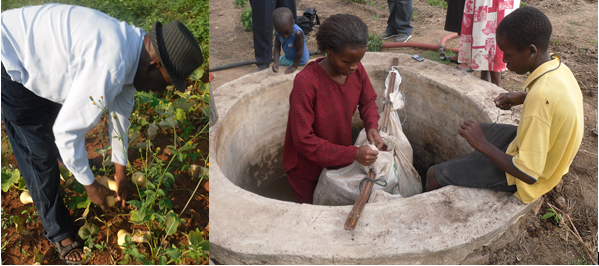The formal education system in many developing countries is organised in such a way that the depth and breadth of knowledge imparted determines grades and qualification levels. Unfortunately, it is difficult to translate this arrangement into real life where societies do not function according to grades and degree qualifications. For instance, farmers and rural communities do not approach knowledge in terms of geography, history, mathematics, religious studies commerce, science and other subjects.
This partly explains why graduates from formal education systems are failing to make a difference in African communities. It is not even clear what level of geography, mathematics, science and commerce should be introduced to a group of farmers in a rural farming community. Many awareness programmes through the media and participatory methods, do not clarify levels of awareness and participation among those involved. The onus is on whoever is bringing a new programme to decide where to start. By the time a starting point has been figured out, the programme has come to an end. The cycle of inadequate participation and awareness continues.

How much should farmers know about soil analysis?
One of the reasons crop yields in African countries have drastically gone down over the past decade is that soils have become sick and tired. The majority of farmers do not understand their soils at a granular, scientific level. They may know about Nitrogen, Potassium and Phosphorus (NPK) but getting them to understand soil pH and the role of trace elements such as Boron, Zinc and Manangese is beyond their cognitive capacity. There are also no vernacular words or descriptions for these trace elements.
On the other hand, do they really need to know all that? Can’t they be competent food producers without knowing all those minute details? In a rural community, whose role is it to advise development partners that some of the knowledge they bring is beyond the capacity or priorities of the local people? There are many African communities where farmers have been taught about Artificial Insemination. While democratising science is a very noble thing, how much of usable Artificial Insemination knowledge can communities acquire without diluting the underlying science?
Importance of trust and institutionalizing knowledge
Setting up institutions for making sense and scaffolding knowledge will provide answers to most of the above questions and issues. It is critical to separate knowledge that can be held at an individual level from that which should be institutionalized into practices and organisations where it can be continuously updated. Institutions help in building trusted institutions that can produce trusted knowledge. If farmers know that there is a trusted institution that can handle soil analyses and animal science issues, they will concentrate on what they are good at and leave that role to the institution. That serves time and money. It takes more than four years for someone to become a full-blown veterinary scientist. How many farmers will be able and willing to go through the whole veterinary knowledge acquisition journey? Specialized knowledge should be left to specialists.
Trust increases the value of knowledge
Trust does not just reduce the cost of doing business. It also increases the value of knowledge. The main reason you can drink fruit juice and eat bread without asking who produced those food items is because you trust the good intentions of the producers even if you don’t know them by name or origin. Without trust consumers would insist on identifying and knowing the actual person who produced that food, how they produced it and the ingredients they used. Trust enables you to believe in what is being put forward as food. Every consumer has to trust someone they don’t know. Otherwise each person would only eat what they produce with their own hands. If people were to insist on participating in the production of everything they use or consume, we wouldn’t have many people owning cars and flying in aeroplanes. You don’t have to know why a motor car drinks both oil and water for you to use one. You trust that whoever produced that car did so in good faith and you will be able to use it for many years without knowing how the pistons work inside the engine. You don’t have to know the pilot or aircraft engineer to fly in a plane. You trust that the pilot and engineers are gifted enough to take care of your interests. Knowledge comes with responsibility.
The importance of institutions
Institutions in the form of rules, regulations and organizations are important in embedding knowledge and trust. The fact that there are standards associations and other compliance bodies gives people the much needed confidence to use or buy goods and services. Rather than focusing on large measurable impact in short timeframes that push people to tell familiar and obvious stories about impact resulting from the adoption of new technology, development organisations should take time to understand knowledge needs and build appropriate institutions. Due to lack of strong, evidence-informed institutions, many developing countries remain stuck in low productivity and widespread poverty.
Without institutions, the capability of governments to implement activities is severely limited because knowledge cannot be adequately harnessed and deployed. Many young African graduates who study abroad and come back home are frustrated when they don’t find supportive institutions that can anchor their knowledge acquired abroad. What is the point of studying robotics in the West when back home there is no institution to support robotics as a practice? In the absence of institutions, sustainable development will remain wishful thinking.
charles@knowledgetransafrica.com / charles@emkambo.co.zw / info@knowledgetransafrica.com
Website: www.emkambo.co.zw / www.knowledgetransafrica.com
eMkambo Call Centre: 0771 859000-5/ 0716 331140-5 / 0739 866 343-6
